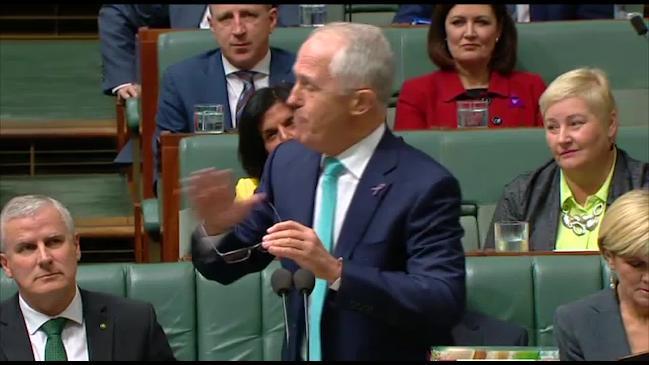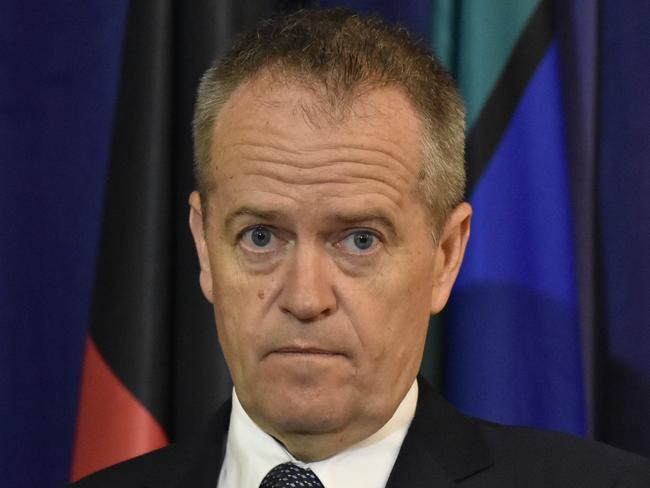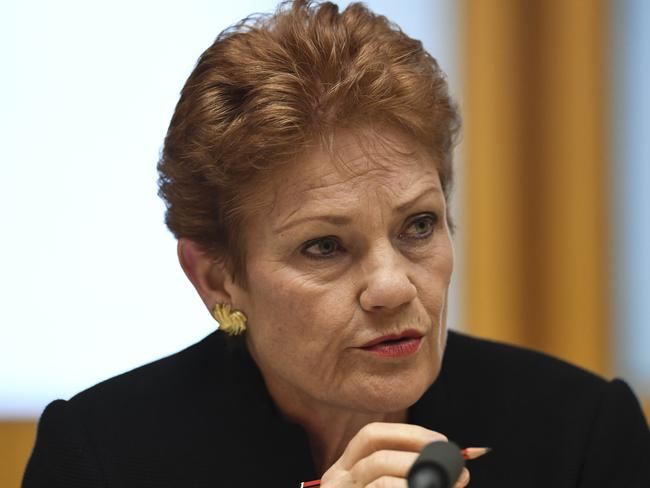Should we be giving companies a tax cut in Australia?
A CONTROVERSIAL plan will see $65 billion ripped out of the Budget, raising concerns about what services will be cut to pay for it.

Companies
Don't miss out on the headlines from Companies. Followed categories will be added to My News.
A PLAN to give big businesses a $65 billion tax break is being criticised as unaffordable and a burden on Australian taxpayers.
The Turnbull Government is making a last push to get its corporate tax cuts passed with the agreement of just two more senators needed.
But Labor is sharpening its attack on the plan, with leader Bill Shorten questioning why funding for services such as schools was being cut while businesses benefited.
“How is it fair that the Prime Minister is cutting billions from schools to pay for his $65 billion handout to big business?” Mr Shorten asked in Question Time today.
Prime Minister Malcolm Turnbull hit back at the claim, saying that over 10 years, Commonwealth funding for government schools would increase by 5.1 per cent, for Catholic schools by 3.7 per cent and for independents by 4.3 per cent.
Labor has previously said the difference between what the Turnbull Government is giving schools in 2018 and 2019 and its plan is $1.88 billion for public schools, $250 million for Catholic schools and $53.5 million for the independent sector.
In a letter to Melbourne Archbishop Denis Hart ahead of the recent Batman by-election, Mr Shorten wrote: “Catholic schools would be more than $250 million better off in our first two years of government alone”.
However, public school parents have criticised Labor’s “spectacular special deal” for the Catholic sector.
Earlier Mr Turnbull defended proposed company tax cuts, saying it would keep Australia globally competitive.
“The rest of the world is not stupid. Company taxes are coming down,” he said.
Today he added that he wanted companies in Australia to be in a position where they could invest, create more jobs and offer better paid jobs. Mr Turnbull said Treasury analysis showed Australian workers would get an average $750 more in wages.
He slammed Mr Shorten’s opposition to the measure and noted the Opposition leader had spruiked corporate tax cuts a few years ago as a measure that would create more jobs and encourage higher wages.
“It shows you cannot trust anything Bill Shorten says,” Mr Turnbull said.

Labor has confirmed it would campaign at the next federal election to scrap the tax cut if it was passed.
It has said 60 per cent of the benefit will likely go to companies based overseas and there’s no guarantee they will increase investment or encourage wages to increase in Australia.
Shadow treasurer Chris Bowen has described the measure as “an unfunded budget wrecking ball” that does not guarantee investment or wage rises, and will eventually be paid for by middle- and low-income working Australians.
“We don’t believe these tax cuts are justifiable or affordable,” he told ABC radio.
Australian Council of Social Service CEO Dr Cassandra Goldie is worried any economic benefit from the company tax cut is decades away, but the cost to the budget would be felt immediately.
“Right now the federal budget is in deficit, and we can’t be confident it will move back into surplus in the next few years,” she said.
“What that means is that if unfunded tax cuts go through, people across Australia will have to start paying more for essential services they have always relied upon.”
Yesterday the government delayed a vote until today while it continued negotiations with senators Derryn Hinch and Tim Storer.
Here’s what you need to know.
WHAT DOES THE GOVERNMENT WANT TO DO?
Currently corporations with a turnover of more than $50 million in 2018/19 will be taxed at 30 per cent, but the government wants to reduce this to 25 per cent by 2026/27, with gradual decreases in the rate starting from 2018/19.
It is aiming to get the tax cut passed this week, the final parliamentary sitting before the May Budget.
It will cost the Budget $65 billion but the government argues it will lead to more business investment in Australia, lift stagnant wage growth and boost the number of jobs on offer.
Finance Minister Mathias Cormann has warned Australia would remain uncompetitive if the tax rate didn’t drop.
“That would mean less investment, fewer jobs ... over time, higher unemployment which would mean less competition for workers here across Australia, which would mean a drop in wages,” he said.
The government has already passed tax cuts for small and medium businesses with a turnover of less than $50 million a year, and it has reportedly warned Senate crossbenchers that it would be “economically damaging” if this was not also passed on to big business.
Labor has already promised to let small and medium businesses keep their tax cuts.

COMPANIES PROMISE TO INVEST MORE IN AUSTRALIA
Last week the Business Council of Australia described the cut as “urgent and vital to keep Australia competitive”.
In response to scepticism about the benefits for Australian workers, the chief executives of 10 major companies BHP, EnergyAustralia, Fortescue, JBS, MYOB, Origin, Qantas, Wesfarmers, Woodside and Woolworths, signed a letter pledging to “invest more” if the cuts are passed.
“We, as some of the nation’s largest employers, commit to invest more in Australia which will lead to employing more Australians and therefore stronger wage growth as the tax cut takes effect,” the letter said.
But as Mr Hinch noted: “The business council letter was very Kumbaya, you know, we’ll do this and we’ll do that, but it didn’t guarantee anything.”
However, Mr Cormann said: “It actually doesn’t matter what intuitively somebody wants to do, what matters is what they have to do.
“Businesses will want to maximise their profits of course, but if businesses have to hire people they will have to pay what the market needs them to pay, and if there’s increased competition for workers, business will have to pay more to secure the services of those workers.”
SECRET POLLING REVEALS DIFFERENT PICTURE
The emergence of a secret Business Council of Australia survey has also not helped make the case for the cuts.
According to the Australian Financial Review, the survey found fewer than one in five of Australia’s leading chief executives said they would use the tax cut to directly increase wages or employ more staff.
In fact more than 80 per cent said they would either use the proceeds to boost returns to shareholders or invest in the company.
AUSTRALIA’S TAX RATE IS HIGH
In justifying the tax cut, some point to the fact that Australia’s 30 per cent company tax rate is considered high.
In a report prepared for the Minerals Council of Australia, the University of Calgary’s Jack Mintz said Australia’s rate was the ninth highest of the 43 countries he surveyed, and is tied with Mexico as the fourth highest in the OECD.
The international tax expert warned Australia would lose investment and jobs to lower-taxed countries.
“The report also makes the point that lower company taxes allow higher compensation to be paid to workers and lower prices for consumer goods,” the Minerals Council’s interim chief executive David Byers said.
Australia’s tax rate is nine percentage points higher than the US.
But in a briefing paper released last week, the Australia Institute found the average rate of tax paid by the 10 companies whose CEOs had pledged to “invest more” if the cut was passed, was 12.35 per cent when analysed as a proportion of taxable income.
It said this suggested companies already paid well below the current 30 per cent tax rate.
The Australia Institute has suggested a third of the tax cut will benefit just 15 of Australia’s most profitable companies.
Australia’s big four banks will also be eligible for the tax cut, although Mr Hinch has reportedly asked for them to be cut out.

WILL IT HAPPEN?
The government needs support from nine crossbenchers in the Senate for the tax cuts to be passed and it has already got support from seven of them including Cory Bernardi, David Leyonhjelm, Steve Martin, Fraser Anning and One Nation’s three members Pauline Hanson, Brian Burston and Peter Georgiou.
Ms Hanson agreed to vote for the bill after talking to mining billionaire Andrew Forrest and the Government said it would support a pilot program for 1000 taxpayer-funded apprentices to be employed by private business especially in rural and regional areas.
Two other independents are in talks with the Government about possibly supporting the cuts.
Reports suggest Mr Hinch could be won over if the Government dumps its plan to scrap a payment intended to help welfare recipients with power bills.
Senator Tim Storer is also working with the Government.
— With AAP
Originally published as Should we be giving companies a tax cut in Australia?


